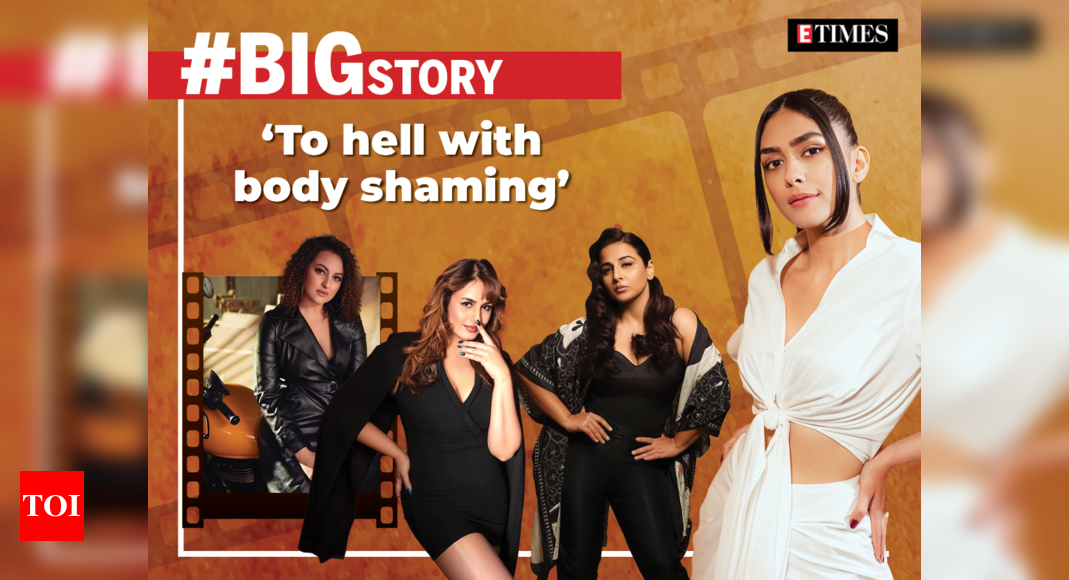#BigStory: Trolling actresses for their body shape or size is not cool – Times of India
Most recently, ‘Jersey’ actress Mrunal Thakur opened up about being trolled for her pear-shaped body. Speaking to ETimes, she said, “I responded because I want the people who fall in my category to feel comfortable. I made an attempt to make this society a ‘chilled out’ place to live in. Do these people who comment against us work on themselves? No, they don’t. It’s time that we stop looking for faults in people.”
Today’s #BigStory explores how the flawed standards of beauty came to be, whether showbiz is responsible for it, how B-Town actresses have been subjected to body shaming over and over again; how they’ve been left with no choice but to develop a thick skin and move on with their lives. Read on.
The flawed standards of beauty
Let’s face it. We are all conditioned to believe that a certain ‘type’ of body is attractive. As psychiatrist Harish Shetty states, how you look defines how you feel, and that makes ‘looks’ important. “Some suffer from a constant preoccupation with their own flesh and fat, and are harsh towards themselves. It’s not surprising for them to shame their own bodies and look for exaggerated solutions which are largely irrational,” he says.
Be it Kareena Kapoor Khan attaining the size zero figure for ‘Tashan’ or Sara Ali Khan undergoing drastic transformation for a career in Bollywood, with the various visuals splashed across the globe focussing on size-zero and curvy slim shapes, young boys and girls develop issues of low self-esteem and become vulnerable to body shaming. “Celebrities hit the gyms vigorously as casting directors run around with measuring tapes! Little criticism is like the last proverbial straw and many young people collapse as their minds go crashing down towards severe depression,” Shetty adds.
In a highly competitive industry where the stakes are high, and rewards and returns even higher, there is immense pressure to outdo a competitor. “Even the most seemingly perfect model on a magazine cover is airbrushed. So the standards and definitions of beauty set by fashion and lifestyle magazines are totally unrealistic and basically selling illusion and delusion. Your appearance on screen makes you a few kilos heavier hence you need to be thinner than ‘normal’ to appear ‘normal’ on screen. A majority of the roles in Indian cinema focus on and highlight the ‘appealing’ body of the heroine,” says actress Pooja Bedi.
It is an image-based industry, agrees Somy Ali. “Let’s not forget Parveen Babi was the first Indian celebrity to rock the cover of Time magazine in 1973 sporting a bikini. If you have it, flaunt it, because I know personally how hard it is maintaining a good figure, more so for women after 35 such as myself. But I am inspired by the likes of Shilpa Shetty, Neetu Kapoor, Karisma Kapoor, Kareena Kapoor, Malaika Arora, Zeenat Aman, and many who work hard and take care of their figures and lead a healthy lifestyle. Look at Jennifer Lopez at 55 she completely defies age. I am afraid if you choose to be a model or an actor, it comes with the territory given everyone is aiming towards a size zero. This mentality will not change in this field or the modelling field,” she says.
Is showbiz to blame?
At a time when cinema and stars are the most powerful influencers, we have seen actors and actresses going the extra mile to look flawless for the cameras. Either they transform themselves with personalised diet and workouts, or there are examples of surgeries, and airbrushing and other after-effects done in post production. Can it be then said that showbiz is setting unrealistic examples of beauty for the youth?
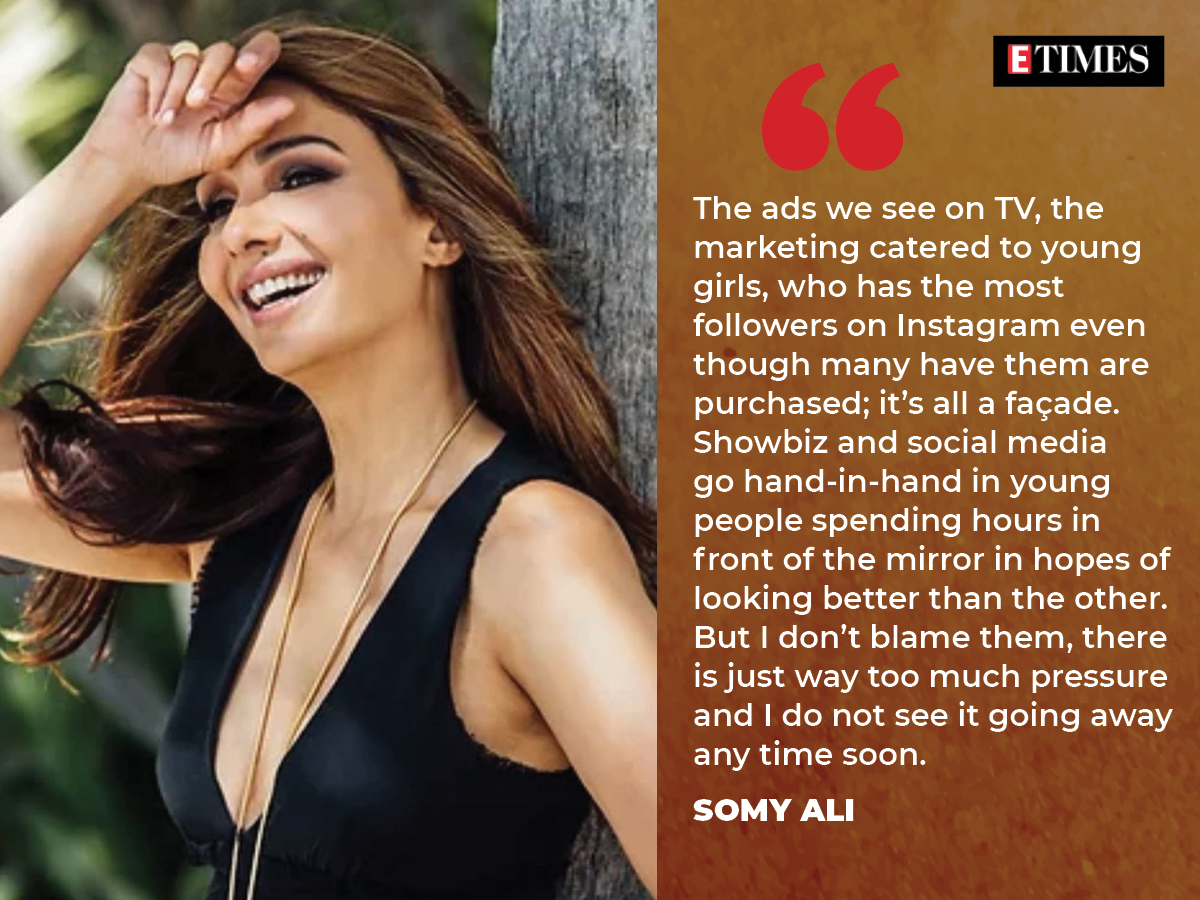
‘Yes, that’s a given,” affirms Somy Ali. “The ads we see on TV, the marketing catered to young girls, who has the most followers on Instagram even though many of them are purchased; it’s all a façade. Showbiz and social media go hand-in-hand with young people spending hours in front of the mirror in hopes of looking better than the other. But I don’t blame them, there is just way too much pressure and I do not see it going away any time soon,” she adds.
Raveena Tandon who has been in the industry for over three decades believes we, as a fraternity, are slowly but surely transforming the flawed pictures of beauty. “There are some great leading examples in society who are paving the way to own your body as it is! We need more such powerful icons changing the way we look at ourselves,” she says.
Actress Ritabhari Chakraborty who will soon be seen in a Bengali film ‘Fatafati’ that deals with body-shaming as it traces the journey of a plus-size model, says, “Showbiz is responsible for such beauty standards, but I also feel it is breaking the stereotypes now. There are many stars who are working towards the same. We are gradually getting there.”
Actresses targetted more than actors
While there are actresses who have been on the higher side of the weighing scale, there have been actors in the same category too. But how often have you come across an incident when a male was criticised for his weight? The statistics will be highly skewed when compared to cases of female actors getting body shamed.
Director Mudassar Aziz is soon coming up with a film ‘Double XL’ which is a story of two plus-size women who navigate society’s beauty standards as they chase their dreams. Sharing his views on body-shaming, he says “Being in the public eye, every little move of actors and actresses is scrutinised as if they are not human beings. I think women have to bear this a lot more than men. We’ve had men back in the days who have undergone a change after putting on weight. There are actors like Sanjeev Kumar and Govinda who are talked about with great reverence and respect to their craft. But I don’t know why it is different for women.”
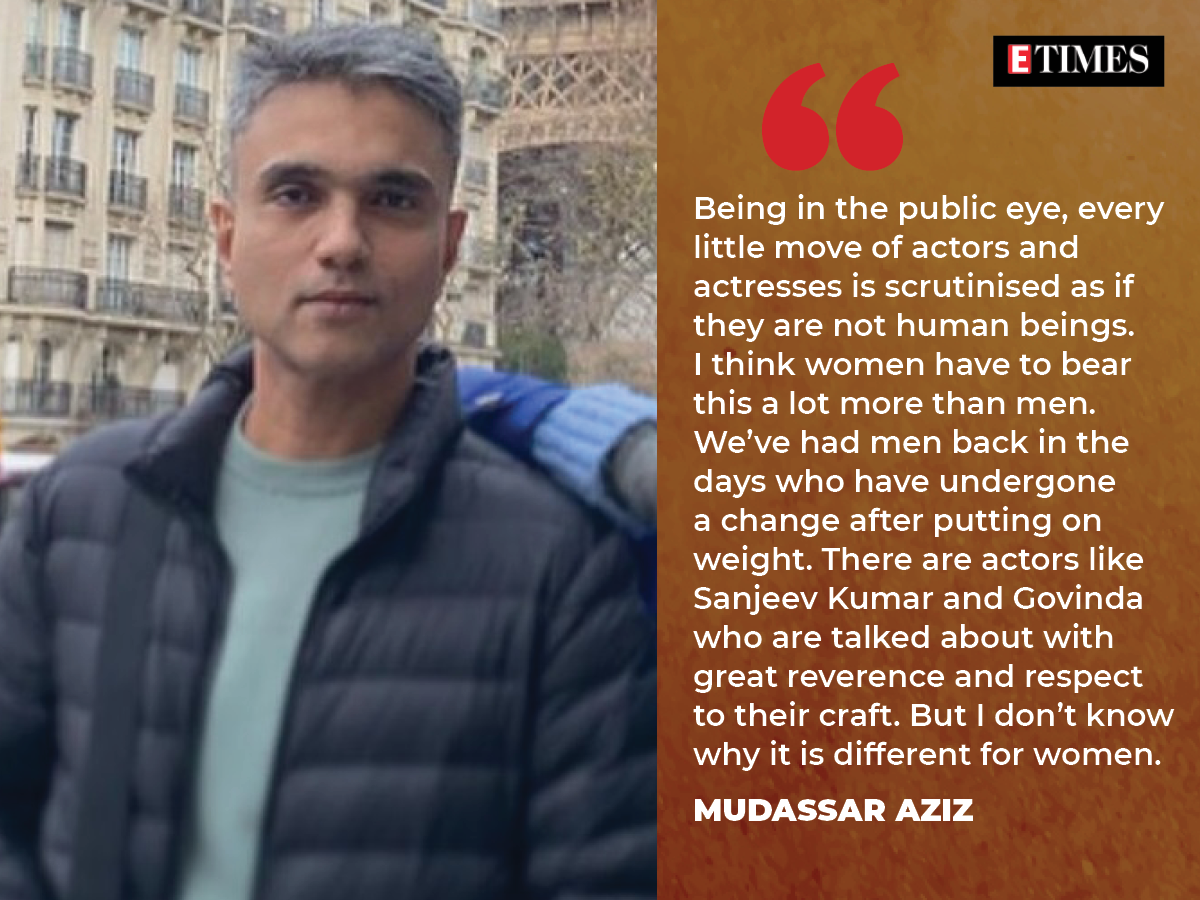
Speaking about how he has tackled the issue of flawed beauty standards in his film, he says, “I wanted to tell the story of two girls who want to pursue their dreams and they will not bow down to the idea that they are too heavy to chase their dreams. I wanted the cultural representation of both Indias. Whether we are educated or illiterate, whether we come from rural or urban India, fat shaming is prevalent.”
Body transformation isn’t an easy job
Anyone who has tried to lose weight can vouch for this statement. But stars undergo drastic transformations as and when the roles demand. But the pressure to look perfect all the time can get to the best of us.
Popular fitness trainer Yasmin Karachiwala deals with several celebs day in and day out catering their specific needs of body transformations for their films or otherwise. Shedding light on the hard work stars put in to achieve a desired body, she says, “Deepika Padukone has very, very specific goals. Like for ‘Pathaan’, she has to wear a swimsuit, and she knows exactly how she wants to look in a swimsuit. So she’ll work at that single-mindedly. Katrina Kaif knows exactly the look she wants to have for each of her movies. So she works towards that and whether that requires two hours of training a day or taking things a notch higher and getting it done in one hour, whatever is required for them to achieve their body goals is what they do. They go the entire nine miles.”
Nutritionist Pooja Makhija echoes the sentiment when she says it’s not easy being a celebrity and having to have different looks and different ways their bodies have to appear in different movies and scenes. “Each movies requires celebs to sometimes lose weight, sometimes gain weight. It’s a part and package of their work that brings them a lot of fame and money and they work really hard towards it. Sometimes in the rush to do it when it is a very short notice, I am assuming, they need to play with their health, which I do not agree with at all. But most of the actresses I know have enough time frame and a window that they have to work towards, their directors give them enough time to lose or gain weight,” she says.
Actresses are much more than just a perfect body
There, we said it! It is important we acknowledge actresses for their talent rather than just for their looks. Actresses like Vidya Balan, Richa Chadha, Neha Dhupia, Huma Qureshi, Sonakshi Sinha and many others have proved their mettle transcending people’s obsession with petite frames.
“I have huge respect for actresses like Vidya Balan and Tabu. Because they have owned up to who they are and they have gone on and become the forces of nature in terms of their profession. They have created a niche for themselves. Today, they are irreplaceable. Huma Qureshi and Sonakshi Sinha have also landed up doing that in their own way. You can never really say, how many countless mental health issues can these practices cause though,” says Mudassar Aziz.
How actresses deal with trolls
Faced with unreasonable criticism day in and day out for the way they look, or the way they walk or what they wear, actresses have no choice but to let sleeping dogs lie. While some choose to shut the trolls in their own savage style, some others decide to simply ignore the chatter and move on with their lives.
Krishna Shroff who lives life on her own terms says she just does not pay heed to trolls. “I’ve become so thick skinned and that comes with the fact that I’ve put myself out there as much as I have and been unapologetically myself throughout it all for a while now. I understand that it’s all a part of the profession, so I’m prepared for it. Like I said, an outsider’s opinion about me isn’t my reality and certainly doesn’t change who I know I am, so keep it coming,” she says.
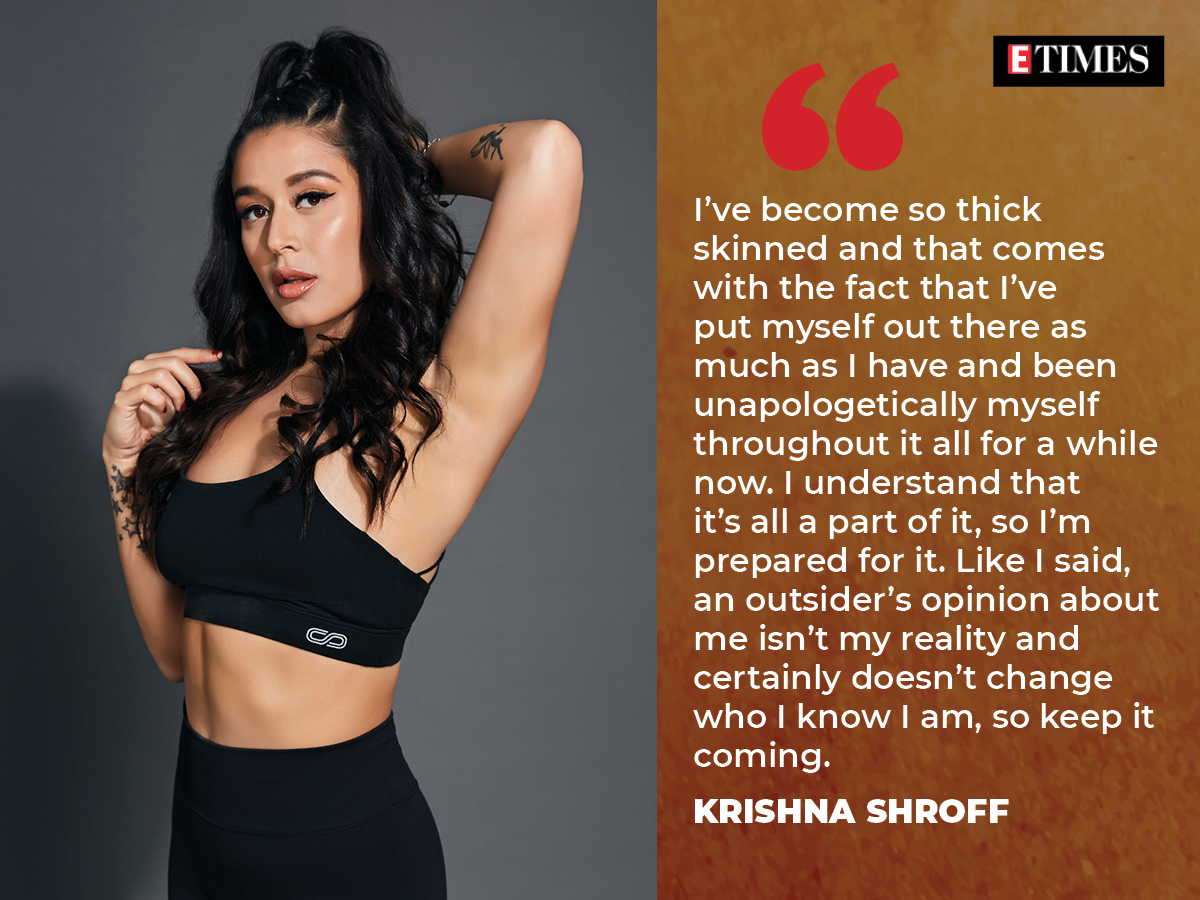
Nimrat Kaur recently put on several extra kilos for her role in ‘Dasvi’, and shared her transformation story with the world after losing it again. She chooses to not deal with any comments that are targetted at her. “I believe that validating someone trying to bring you down gives them importance. I have always been a firm believer in turning away from such comments and not being bothered by someone anonymous sitting behind a screen somewhere in oblivion. I find the entire exercise of going behind somebody pointless. The only reason I posted about my journey was to throw light on the fact that people need to mind their own businesses, be mindful, respectful, and be cognisant that someone could be going through something that you aren’t aware of,” she said.
Somy Ali has always taken the road less travelled and not given a damn to what people think or say about her body. “Only I know my obstacles and my hardships, not trolls who have nothing better to do than to put others down in hopes of making themselves feel better,” she says.
Speaking about the trolling her celebrity clients are subjected to, Yasmin Karachiwala says, “I think it’s really important to have a very sound mind. They need basically to work on the sanity of the mind, so that they can handle or achieve anything. I also think celebrities are used to trolling now, because social media is so accessible to everybody that they get to talk about anything, And of course, it’s hurtful, especially if you’re trying to look great, and people start talking about your weight. So it’s really important to constantly bring in positivity and feel good about the achievements rather than focussing on the disappointment of things that they can’t do.”
Change can begin at home
Body shaming is a social peril that needs to be addressed and uprooted, the sooner the better. While malicious cyber behaviour can be indicative of low self-worth of the offenders, it does more harm than is visible, to the person who is at the receiving end of the trolling.
Mudassar Aziz, who has himself been a victim of body shaming in his childhood, believes change can begin early with right parenting. “I grew up as a fat boy in South Bombay. I was the butt of a lot of jokes in school. So it starts very early in our society. They way we introduce our children to caste, creed or race, parenting needs to involve telling the kids, very early on, that people come in all shapes and sizes, and that they have to be seen for who they are as opposed to how they look. That’s where change begins if we really want to tackle the issue. It is important that kids are made to understand that people are genetically different,” he says.
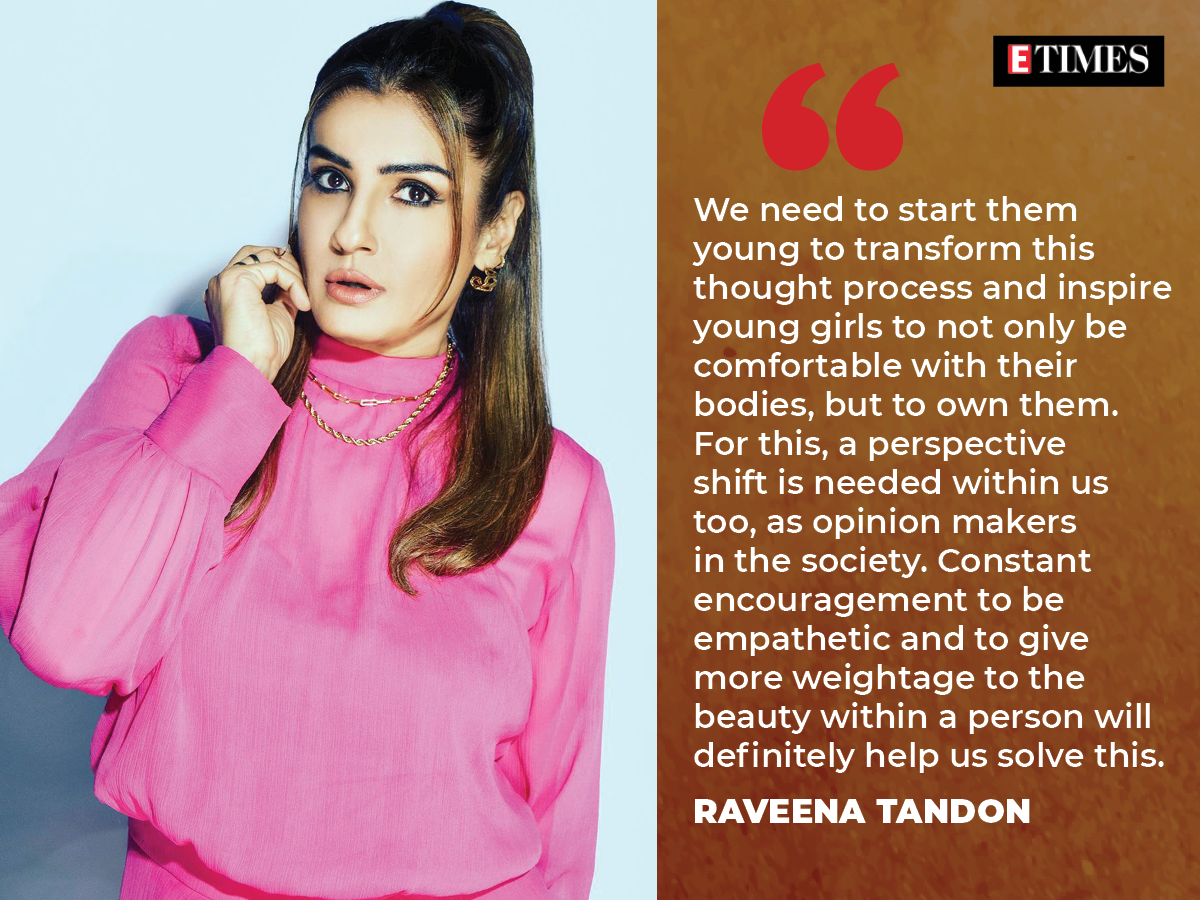
Raveena Tandon agrees as she says we need to start them young to transform this thought process and inspire young girls to not only be comfortable with their bodies, but to own them. “For this, a perspective shift is needed within us too, as opinion makers in society. Constant encouragement to be empathetic and to give more weightage to the beauty within a person will definitely help us solve this,” she says.
Nimrat Kaur believes the lack of accountability is the biggest obstacle when people think that they have the license to say whatever they want on social media. “They need to be traced and blocked. So, there are irreversible consequences for their actions. If there is a fear of dealing with consequences, it will discourage people from posting random comments. One also has to work towards educating such minds. The mentality needs to be rectified with education and awareness,” she opines.
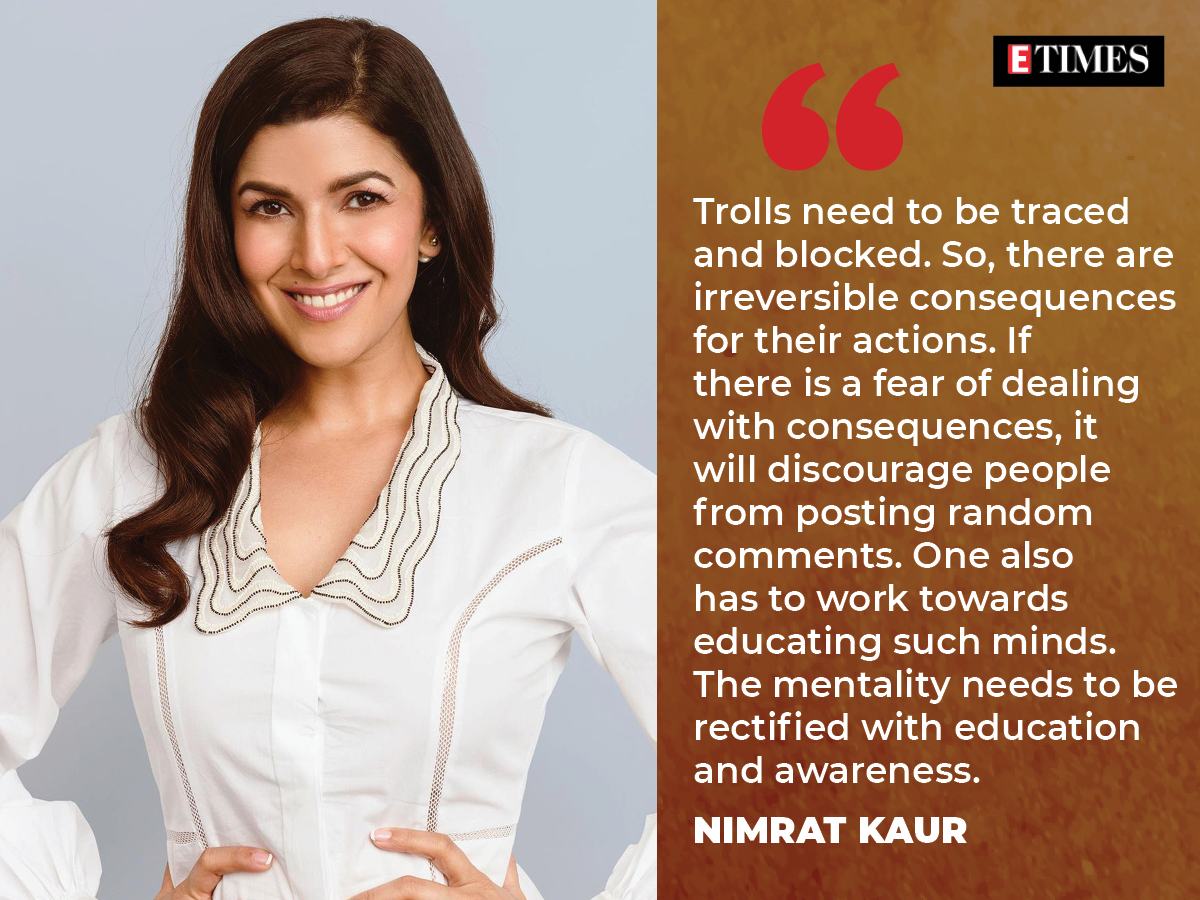
Saie Tamhankar believes it is us humans who are the obstacles. “It is time to renew the way we bring up our children. I think the body shaming and comments that objectify deserve absolutely no attention, time or energy,” she concludes.
For all the latest entertainment News Click Here

